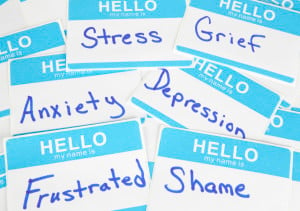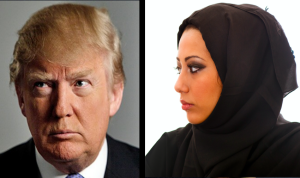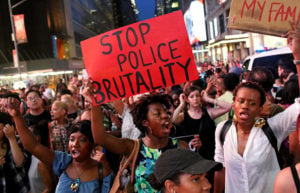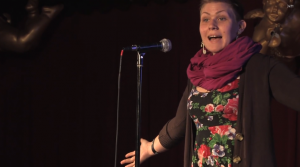Hey, ya’ll. This video is part of a series I’m doing for Everyday Feminism. Everyday Feminism is a website dedicated to helping you stand up to and break down everyday oppression. In this video I want to talk about the ways that patriarchy damages men’s emotional literacy.
I’ll talk about the mail gaze first. Women internalize the male gaze in so far as we’re conditioned to look at our bodies as objects to be gazed upon and to be decorated. When we look at ourselves a lot of us have internalized this idea of what femininity is, and we self-police accordingly. When we look at ourselves it’s like a voice in the back of our head that is judging us, and this is the male gaze. This is something that is society-wide, that we’re all taught.
Men I think also internalize this gaze, although slightly differently. Men internalize in that they are required to look and act in a manner that they believe other men would approve. This really ultimately negatively affects the development of certain human capacities like emotion in men.
In patriarchal society, men hold a more powerful position relative to women and non-binary people in the hierarchy of gender. Although men might be evaluated by women seeking sexual partners, the standards against which their masculinity is measured are really held in place by other men. Men are prisoners of masculinity in so far as they internalize these cultural definitions of manhood.
Some of these definitions would be that masculinity requires men to build this invisible wall of toughness around them. They’re not allowed to show vulnerability. This is something that men are often taught as very young children to “man up,” and, “Don’t cry. Be a man.” These are things that we are constantly told growing up, so they sort of become incorporated into ourselves. That’s what I mean when I say that we internalize the male gaze. We internalize them so deeply that we cannot tell whether we’re evaluating ourselves or we’re being evaluated by this gaze.
Men also might have inner conflicts about masculinity and the norms of appearance, but they’re very often compelled to hide this kind of confusion by acting more confident than they even really feel, because confidence and assertiveness is itself tied to masculinity.
Another thing is manliness is often associated with the external aspects of performance like physical size, willingness and ability to fight, and dominance over other people. This helps explain why men commit far more acts of violence than women, because these concepts are built into the idea of manhood, so in order to prove one’s manhood, often it requires one to act out violently. As we’ll see, men also act out violently because these are the only socially sanctioned ways that they can express their emotion in a lot of cases.
Also because men and masculinity exist in relation and in reaction to femininity, men have to constantly be distancing themselves from feminine traits in order to gain respect from other men. That could mean that men don’t want to show any kind of emotion because emotion is tied to being a woman and being feminine. I’m not saying that it’s easier to be a woman, because obviously there’s a lot of negative connotations attached to being emotional. Oh, women are overemotional. Women are too emotional. They’re not rational. All of this stigma attached to it.
There’s also a negative side to not being able to express the emotion and still have the status of manhood. Here we come to the damage on men’s emotional system. This kind of hegemonic masculinity that I very briefly outlined is the kind that supports the view that violent behavior in men is a normal means of dealing with emotional pain. When you see that macho man in the movies punching the wall or getting in a fight because he’s upset, because he’s hurt by someone, because he got broken up with, these are ways that we’re taught to understand how a man expresses his emotional pain an vulnerability. There really are very few socially acceptable outlets for men to express these feelings otherwise, so men find violent outlets, whether against other people or against themselves.
Repressing emotional vulnerability is not only dangerous in that it causes men to lash out with physical violence, but it also leaves men incredibly alienated and isolated from their feelings. Isolated in the sense that they’re not able to connect with other people on a deeper level very easily because they are not allowed to express these emotions, and also alienated, because expressing these emotions means learning what these emotions are. Women are granted more specific to do that in our society even though it also comes with the attached dismissal of what they’re saying. Also women are allowed to express these emotions in a way that still grants them the status of woman, whereas when men express these emotions they can lose the status of men.
Given the fact that manhood greats a great degree of school status, especially for men of color and marginalized men, this idea of being the masculine man will grant them a lot of social power that they might otherwise not have access to.
Ultimately, it’s important that we understand why men continue to attempt to live up to these expectations, just like us women, even feminist women like myself, why I continue to try to live up to these norms of femininity even though I know that they are not real constructs. They’re something that I’ve been conditioned to take on. I think that a lot of men understand that masculinity is this construct and it is something that is potentially harmful, or at the very least, it’s not something based in total reality. Yet, it does really affect them and it really affects the way that move through society. The same goes for femininity.
It’s also something that we’ve all internalized so deeply that it’s really hard to distance ourselves from it. It’s important to understand where men are coming from, but also to understand why masculinity is so harmful, not only to other people, but to men themselves it’s harmful. If we can understand that and we can start talking about that, then it’s more likely that men can start to challenge these norms and start to understand how important it is to be emotionally literate and to grant men that space to express their emotions in a more healthy way. I hope this was helpful, and I’ll see y’all in my next video.




















